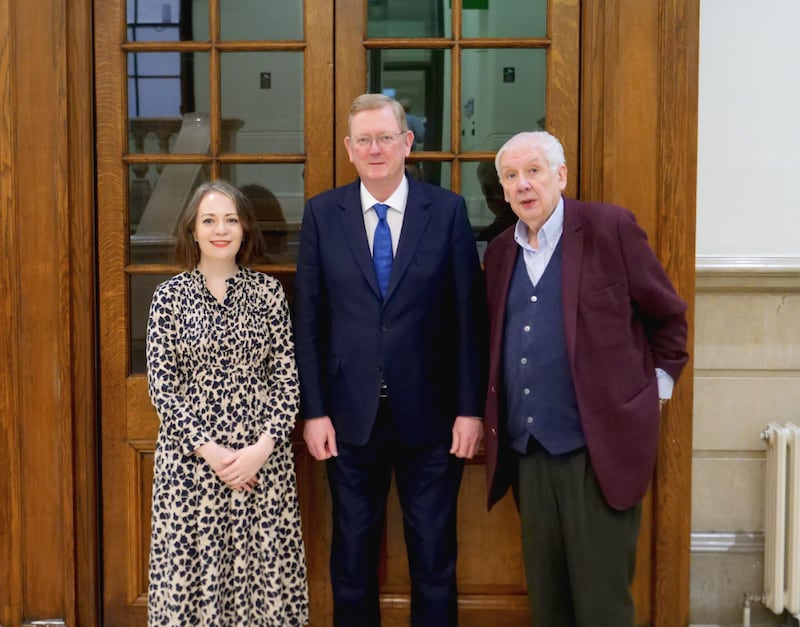IT is over a month since the co-chairpersons of the expert advisory panel of the British government’s “independent public history” project, Lord Paul Bew and Dr Caoimhe Nic Dháibhéid, were pictured with Lord Caine, one of the sponsors of the Legacy Act, at its public announcement.
There has been much discussion and debate since then about the project but the two fundamental problems many people have – its links to the Legacy Act and the ethical implications of historians accessing files denied to families of victims – remain unsatisfactorily answered.
Some would have us believe that this history project was spawned in Oxford in 2014 and has nothing whatsoever to do with the legacy legislation.
Others bemoaned the timing of the announcement, which coincided with the enforcement of the reviled Legacy Act, thus “confusing” both with each other. Even the Northern Ireland Office, who you’d think would be proud of both of its endeavours, was quick to claim that the history project had nothing to do with the Act.
However, Lord Bew backed an amendment from Lord Godson in the House of Lords that would have included the history project in the legacy legislation. Although not included ultimately, much of the debate on the Act focused on this history project, which in many ways was centred on what Baroness Kate Hoey believed was “the one-sided nature of much of the academic research into our past”.
- No historian should have anything to do with Britain’s ‘independent history’ of the Troubles – Cormac MooreOpens in new window
- Platform: Troubles history project will have ‘full access’ to British government filesOpens in new window
- Brian Feeney: There cannot be an official history of the TroublesOpens in new window
When this project was first mooted by the British government in 2021, the Daily Telegraph reported that it “will be commissioned under government plans, amid fears the narrative of the conflict is being distorted by republicans”.
Former secretary of state Brandon Lewis confirmed the intention to commission an official history by independent historians in a press release about the introduction of the Northern Ireland Troubles (Legacy and Reconciliation) Bill the following year.
It is clear the history project was being prepared in tandem with the Legacy Act. It is not clear, though, when or how the expert advisory panel was appointed and by whom. Did Brandon Lewis or Chris Heaton-Harris ask Bew and Nic Dháibhéid to chair the panel? Did the NIO ask other members to join the panel? When were they approached? As Professor Nicholas Allen has pointed out, clarity and transparency are required from the origin of this project rather than from its announcement.

While the panel has unconvincingly tried to separate the history project from the Legacy Act, it has only belatedly attempted to address the biggest problem most people have: the ethical implications of a select few historians accessing files denied to families of victims.
Members of the panel and others who support this project have centred their arguments around historiography rather than ethics. Accepting the challenges that will be faced in gaining access to Troubles files which all British governments have been reticent to disclose, panellists have argued, weakly in my view, that it is worth a try and that they can alert the public if the British government blocks historians from accessing files or deviates from the terms of reference of the panel.
The word “ethics” does not appear once in those terms of reference. In a letter to this newspaper on May 17, responding to Dr Brian Feeney’s article from May 8, one of the panel members, Professor Ian McBride, stated his “intention is not to minimise the ethical challenges of the public history project. On the contrary, the plans for the project will be subject to an ethics review, drawing on the advice of academics with relevant expertise”.
Given the nature of the project and the current environment it is enveloped in, surely an ethics review should have happened at the outset? The review element appeared to be only mentioned following the backlash to this project, a case of closing the stable door after the horse has bolted.
The official history project was announced by the British government the same time it was closing down avenues for the families of victims to seek justice for the deaths of their loved ones. Unlike with most of the other official histories commissioned by the British government, this Troubles-related one has real-life, modern-day consequences.
For such a sensitive topic to have had any chance of success it needed to be fully independent and it needed to have addressed all of the ethical issues involved
For such a sensitive topic to have had any chance of success it needed to be fully independent and it needed to have addressed all of the ethical issues involved. This project is not independent. It will forever be associated with this Conservative British government’s approach to legacy issues. It is joined at the hip with the Legacy Act no matter how many times panel members say otherwise.
Largely ignoring the questions around ethics suggests that the panel does not have adequate answers to offer on the area most people are particularly exercised by.
This history project, which is tightly controlled by the British government, provides cover to it and helps to legitimise it, using historians as pawns to give the pretence to its commitment to accountability which the world can see in real-time is nothing but a ruse.
Undoubtedly, many panel members hope the problems with this project will disappear in the likely event that this dreadful government is defeated at the polls in the coming weeks. They won’t. Due to the way the project was conceived in the environment it exists in, this history project has failed even before it has started.




